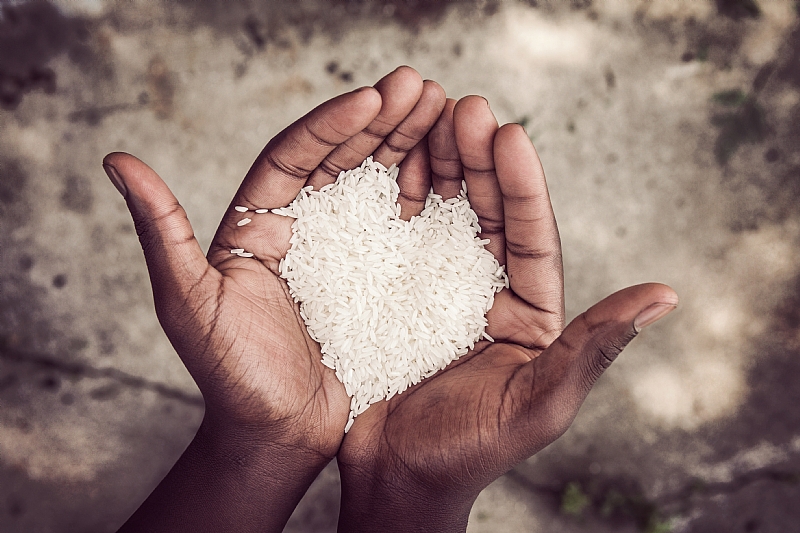
[ad_1]
As the SARS-CoV-2 virus continues to spread and countries take steps to contain it, millions of people have lost sources of income and experts are warning of an imminent “hunger pandemic.”
Those who depend on daily wage labor and lack savings have been hit the hardest. Food shortages are worsening in rural areas of countries that face seasonal hunger even in normal times. For us as researchers studying early childhood development, the signs are deeply troubling, particularly in light of our new findings that even brief periods of food insecurity can harm children’s long-term development.
Even before the COVID-19 pandemic, 690 million people were not eating enough. The pandemic can add 265 million people to that number. A set of coordinated studies in several low-income countries found that between 25% and more than 50% of respondents reported cutting back on food consumption or skipping meals.
For hungry children, school feeding programs have long been critical safety nets. They are a scalable and effective way to keep kids in school and free up family finances for other things. Research shows that school meals improve nutrition and learning, especially for vulnerable groups such as girls and the poorest, or children in conflict. But most schools globally have been closed at least part of the time during the COVID-19 pandemic, and 265 million children are missing their daily school lunches. Our research shows that this can have impacts even after the current crisis is over.
Our multi-year study focused on Ghana and the association between household food shortages and early childhood development.
Before the impact of COVID-19, Ghana shared many of the food security challenges of other countries in the region: 2.5 million Ghanaians, especially in rural areas, are severely food insecure. One in five preschool children suffers from chronic malnutrition, a condition linked to long-term health and financial problems.
COVID-19 has likely made this situation worse: More than 40% of Ghanaians who responded to a recent survey say they have had to limit portion sizes at meal times or reduce the number of meals since February 2020. Households with school-age children are more likely than those without children to report that they cannot buy the usual amount of food because family income has decreased.
Schools will remain closed until next year and the government’s free school meals program has been suspended as a measure to combat the virus.
Our multi-year study found that even reporting food insecurity in one survey round, but not the others, was associated with poorer child development outcomes. Our findings suggest that urgent action is needed to ensure that people have enough food during the current global pandemic. Not only are their livelihoods at risk, but millions of people suffer from hunger.
Short periods of hunger can have lasting consequences
The study followed the same parents and children between 2015 and 2018. We measured household food insecurity experiences and a variety of children’s outcomes, including academic, social-emotional, and cognitive achievement. We also collect measures related to children’s homes and school records, including indicators of school quality.
The home experience is important. In addition to the direct impacts of hunger on development, parents’ struggle to provide the next meal affects their mental well-being and that of their children.
We found that children from households that were food insecure, even once during the three-year study period, had lower reading, writing, and arithmetic skills and short-term memory performance later on. We cannot say for sure whether food insecurity alone caused these worse outcomes. But even after accounting for differences between children’s family backgrounds and school quality, a child who had been in a hungry home did worse on a mental task (like remembering a series of numbers) years later. This was true for boys and girls, indicating that boys are similarly affected.
Our results echo those of previous studies from India and the US Overall, this evidence suggests that even short-term experiences of food insecurity in the home, especially during preschool and early elementary school , can lead to persistent deficits in children’s academic and social-emotional outcomes.
Thus, while child hunger is primarily an immediate humanitarian crisis, it can also have long-term economic and health implications. We know that children who experience persistent malnutrition earn less as adults.
So what can be done?
Fortunately, many countries have taken action. Ghana and South Africa, for example, expanded safety net programs or instituted new ones to include food distribution, although some of them have ended. The World Food Program and UNICEF partnered to provide take-home rations, vouchers or cash transfers to children in 68 countries.
Strengthening cash transfers as Ghana and other countries have done offers families the option to spend on food, rent or medicine. This could be particularly useful for the new poor, such as urban day laborers or agricultural workers whose work may have dried up completely.
Even if they are closed, schools can be a base for distributing food that is cooked on the spot, as in Liberia and some states in India, or take-home rations, as in Sierra Leone. This leverages existing physical infrastructure and trusted community institutions while supporting local food providers. Alternatively, secure door-to-door or staged distribution could avoid overcrowding and help communicate health messages about COVID-19.
Countries need multisectoral approaches to food insecurity, because child hunger is a humanitarian, educational and economic crisis. Budgets are already overloaded, but the costs of inaction will be felt for a long time.
Elisabetta Aurino receives funding from UKRI, the British Academy, Imperial College and the World Bank.
Sharon Wolf receives funding from UKRI, the British Academy, Imperial College and the World Bank.
By Elisabetta Aurino, Professor, Imperial College London and
Sharon Wolf, Assistant Professor, University of Pennsylvania![]()